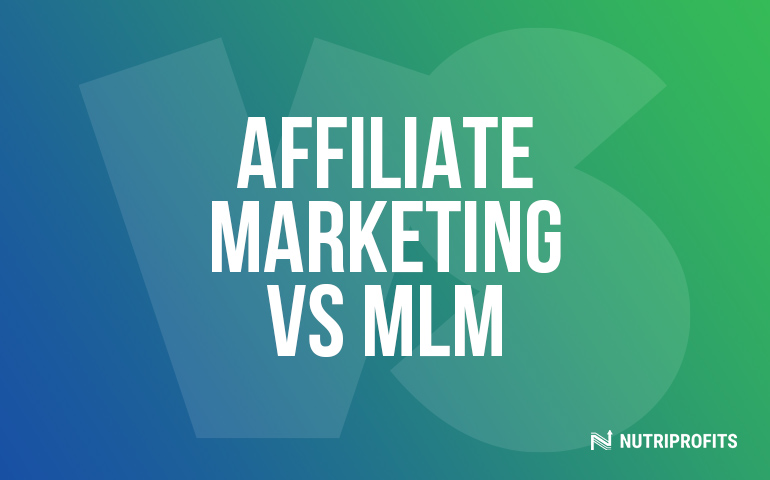It’s nice to make easy money online, but some methods are better than others. When we think about making money online, we tend to think of two methods–affiliate marketing and MLM (multi-level marketing). After all, both methods allow us to make money from anywhere at any time.
While some of us will be tempted to choose the method that will make us the easiest and quickest money, we must analyze the differences between these two to make the right choice.
It’s easy to think that affiliate programs are like, if not the same as, multi-level marketing, but that thought couldn't be anywhere near the truth. So, to make earning money more accessible and safer, here's the difference between MLM and affiliate marketing.
What is Affiliate Marketing?
Affiliate marketing lets a person earn commissions by promoting a service or product from an affiliate program. The person, known as an affiliate marketer, gets a payout for providing a particular result to said company. That result is usually a sale, but some companies reward their marketers for clicks, downloads, free trials, or leads.
Affiliate marketers refer products and services via blogs, social media, podcasts, or websites. Every time somebody purchases a product or service recommended by an affiliate marketer through a unique link associated with whatever recommendation, that marketer earns a commission.
Commission rates depend on which affiliate program we're working for and the program's offer. At the lowest, we can expect to earn around five percent of sales. However, we can earn as much as 50% of sales with some arrangements, but that's when we promote a class or event. Some companies pay marketers via flat rates per sale instead of percentages.
There are three types of affiliate marketing: unattached, related, and involved. Pat Flynn, a well-respected affiliate marketer, used these three groups to categorize these types of affiliate marketing in 2009.
Unattached affiliate marketing is where we don’t have any authority in what we’re advertising or any connection to our customers. We’re usually running pay-per-click advertisements with our affiliate link.
Many people enjoy the unattached type because it doesn’t need any legwork. Affiliate marketing takes a lot of time and relies on reputation and trust from a target audience. Not everyone has the time for building a relationship with their audience, so that’s why unattached marketing is the most popular.
Related affiliate marketing is when we promote products or services related to our niche that we don’t use. In this case, we have an audience on social media, blogs, or anywhere else. Most social media influencers fall under this category. Since many people follow influencers, they trust these affiliates when they promote products or services–even if the influencers have never tried them before.
One problem with related affiliate marketing is that you may be uncomfortable promoting something we've never tried before. How would we know whether what we're promoting is any good? If the product or service is terrible, we could lose the trust of our audience. Trust is essential for affiliate marketing and earning commissions.
That's why, when recommending products or services, many marketers prefer involved affiliate marketing. If we're going to promote something, it needs to be something we've used and can trust. In involved marketing, we promote products and services that benefit our audience. Building credibility may take some time, but it's sustainable and beneficial.
When we choose involved affiliate marketing, advertising becomes much more manageable. We don't have to lie to our audience or hide behind PPC ads for clicks and sales. An organic blog post or Instagram story is the most honest way to advertise a product or service and the best way to become a trusted source of any topic.
What is MLM (Multi-Level Marketing)?
MLM, or multi-level marketing, is when we sell products or services directly via independent sales representatives. Also known as direct marketing or network marketing, MLMs have become infamous for promising representatives wealth and independence.
In an MLM, representatives are responsible for selling a product or service instead of a retail outlet. This would make the representative an independent business owner, but the product is not what the representative is selling. Instead, the representative recruits other people to sell said products or services.
Think of it like a pyramid. At the top is one person–an MLM's first independent distributor directly hired. That person recruits five people to sell a product or service, and those five recruit five more. The cycle then continues. That's why many people think of MLMs as pyramid schemes.
MLMs must sell at least 70% of their goods to non-representatives, but that can be difficult to prove for many of them. Many MLMs take their representatives’ words to heart if they claim to have sold most of their inventory instead of shoving it in a garage or closet.
Even if 70% of their goods were sold, many representatives don't make much money despite the promise of wealth. 99% of MLM representatives lose money since they struggle to sell products and recruit new members.
MLMs are infamous for unethical business practices. They often use manipulation and blame the representatives for any failures of selling a product or recruiting a new member. LuLaRoe, an infamous MLM, was sued for unpaid invoices and defective products. The company settled a suit with the state of Washington, which had sued it for running an illegal pyramid scheme.
Differences Between Affiliate Marketing and MLM
Now that we've defined affiliate marketing and MLM, it's time to discuss the differences. Even though they sound similar at face value, affiliate marketing and MLMs are pretty different.
Both affiliate marketing and MLMs pay representatives when someone makes a sale. However, affiliate marketers' commissions gain no matter how much they earn monthly while MLM representatives have their commissions based on a monthly reset. When MLM representatives don't meet a mandatory goal, they don't receive a payment. Thus many of them buy their own products to meet said goal.
Another difference between affiliate marketing and MLM is the choice of products we promote. Affiliate marketers choose which products or services they want to promote to whichever audience. While there are a variety of MLMs, representatives are stuck promoting whatever the MLM wants to promote this month. This can make marketing harder, as we wouldn't know what we're promoting in an MLM.
However, the most significant differences between affiliate marketing and MLM are the price of joining and what we're selling. Most affiliate programs are free to join; we're meant to sell the product. MLMs need new recruits to buy a "startup kit" that can cost up to $99, and they're more focused on recruiting new members. For someone in a poor financial situation, $99 may be too much to start a new business.
Why is Affiliate Marketing Better than MLM?
We know that affiliate marketing and MLMs are nothing like each other. So, what makes affiliate marketing better than MLM?
Simply put, we don't have to spend any money to join a program or recruit anyone else to join. $99 is too much to spend when signing up for something, which is the price of some MLM startup kits. So, it's a good thing many affiliate programs are free to join.
We also don't have to focus on recruiting friends and family to join us and make easy money online. The only thing we need to sell is the product we're supposed to promote and nothing more, and we can choose which product we sell. That way, we can build and keep our trust with our audience.
We can also make money immediately after selling a product. We'll have to reach at least $50-$100 before withdrawing, but it's immediate. MLMs make us build our commissions slowly, and we often lose that money from buying our own inventory anyway.
Conclusion
It's nice to make easy money online, but some methods are better than others. Whether selling a product vs. recruiting members or spending however to join, it's crucial to know the difference between MLM and affiliate marketing to make the right choice.





.jpg)

-1-1.jpg)